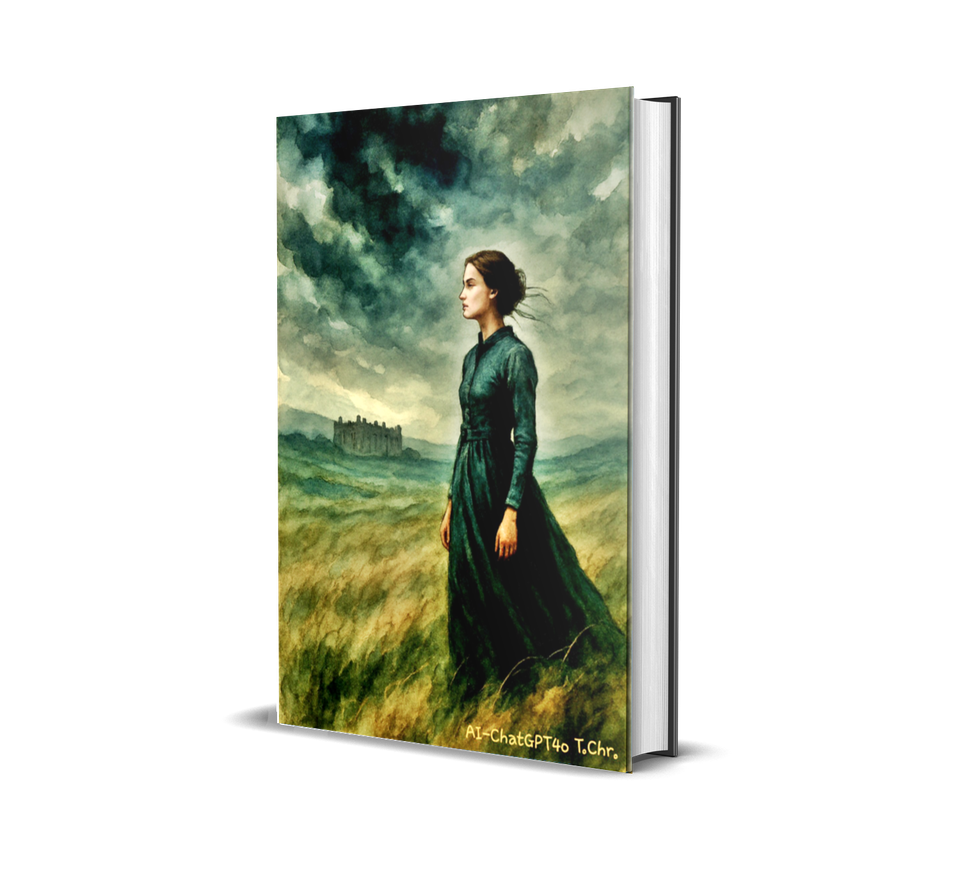The Storm and the Girl

By AI-ChatGPT4o-T.Chr.-Human Synthesis-20 July 2025
It began with a storm. Not the kind that merely rattles windows, but the kind that speaks—shouts—through the bones of the house and the heart of a child. I was eight, and for the first time in my life, I was truly alone. Not just left unattended, but unseen. Unclaimed. Unprotected.
The wind keened like a warning as I stood at the window, watching the trees convulse. Inside, silence swelled like a presence, heavy and alert. The walls of the room seemed taller, the shadows deeper. I did not cry. I did not call out. I simply stood and listened to the storm—and to something new stirring inside me.
It wasn't freedom. It was too cold for that. It was something sharper, more dangerous. Independence, yes—but wild, lonely, unsweetened. That was the moment I understood Jane Eyre.
Later, when I found her, or rather, when she found me, she didn’t feel like a character. She felt like a companion who had waited centuries for someone like me to listen. She didn’t arrive prettily dressed. She came fierce and quiet, with her hands clenched and her back straight. She had walked through fire and humiliation, and still she stood—small, poor, plain. And incandescent.
Jane was no fantasy. She was a map.
Each step of her story traced the lines of a soul bent on preserving its own integrity, even when the world insisted she didn’t deserve one.
From the red room—where she was locked up as a child, her grief mistaken for wickedness—to the harsh walls of Lowood where cold replaced cruelty and her hunger was never just for food, Jane was told she was less.
Less than boys. Less than beauty. Less than wanted. But she refused to be less.
That refusal wasn’t loud. It didn’t come with raised fists or shouted speeches. It came with small, defiant choices. To answer back. To love without surrender.
To walk away from everything.
When she met Rochester, I braced for disappointment. Another brooding man. Another silent woman melted into romance. But Brontë shattered that expectation.
Rochester was not a prize. He was a test. Their connection was not sweet. It was volatile. A dialogue not of flowers and sighs, but of conscience and conflict. Jane saw him clearly—not as a fantasy, but as a man broken in ways that mirrored her own fractures.
He offered love. She demanded respect.
He offered security. She walked into uncertainty. He said, “Be mine.”
She replied, “I must belong first to myself.”
Even when love burned through her like wildfire, she turned from it when it asked her to bend her moral spine.
She left him. Not because she didn’t love him. Because she did—and loved herself more.
The solitude that followed was not romantic. It was raw, and Brontë wrote it without decoration. Cold winds through moors. Empty rooms. Echoing thoughts.
But even there, Jane’s voice remained steady. Not ornamental. Not meek. Insistent.
What moved me most wasn’t when they were reunited. It was that she returned not to be claimed, but to meet her equal.
reak, but strengthened by it.
Their reunion was not a swoon—it was a reckoning.
A second storm, this one internal, and she stood through it just as she had at the window as a child. And when it ended, I didn’t feel like I had read a love story. I felt like I had survived something.
Philosophical Overview
Jane Eyre is not a tale of romance. It is the anatomy of solitude. It teaches that the fiercest form of love is not the one that consumes, but the one that respects the boundary between two burning souls.
Jane’s strength lies not in her passion, but in her refusal to betray herself. Her life is an act of radical preservation—a declaration that the self is sacred, even when overlooked, even when unloved. In a world eager to claim, tame, and define her, she remains wild beneath the surface.
That wildness—rooted in conscience, not chaos—is her rebellion.
She reminds us that survival is not just breathing through pain, but protecting who you are through it. In the end, Jane Eyre is not about finding a man.
It is about refusing to lose yourself—even when the storm howls, even when love beckons, even when silence surrounds.
And that… is the fiercest freedom of all.
